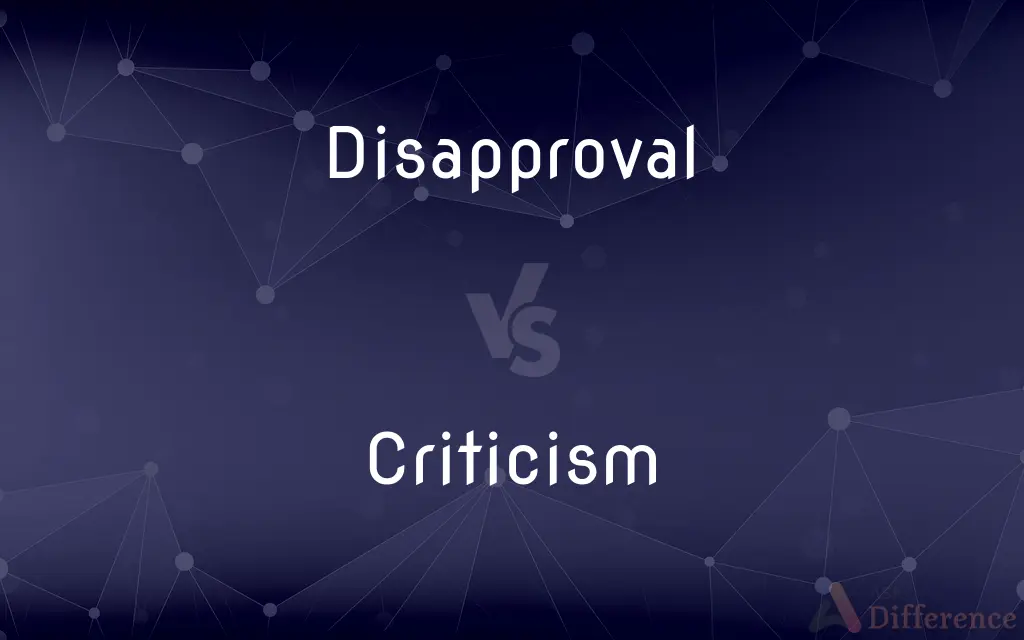Disapproval vs. Criticism — What's the Difference?
By Tayyaba Rehman & Fiza Rafique — Published on October 19, 2023
Disapproval is expressing an unfavorable opinion, while criticism involves detailed analysis, often pointing out faults.

Difference Between Disapproval and Criticism
Table of Contents
ADVERTISEMENT
Key Differences
Disapproval and criticism, although linked in negative assessment, hold distinct nuances. Disapproval hinges on expressing a personal unfavorable opinion or disagreement, often rooted in individual perspectives or societal norms. For instance, a parent might show disapproval of a child's choice merely based on personal bias.
Criticism, on the other hand, involves a detailed evaluation or analysis of something, often highlighting areas of weakness or fault. It can be constructive, aiming to improve, or can simply point out flaws. For example, a book reviewer might offer criticism about a novel's plot pacing, backing it up with instances from the text.
Where disapproval is a broad, often immediate reaction, criticism delves deeper, providing specific reasons. Disapproval is a sentiment, a feeling of not agreeing with or liking something. It's akin to shaking one's head in disagreement. In contrast, criticism, especially when well-founded, is like giving a thorough explanation for that disagreement.
In essence, while both words carry negative connotations, disapproval is more of an emotional or instinctive response, and criticism is a more thought-out, detailed feedback mechanism. It's the difference between saying "I don't like it" (disapproval) and "Here's what's wrong with it" (criticism).
Comparison Chart
Nature
Broad unfavorable opinion.
Detailed evaluation, often pointing out faults.
ADVERTISEMENT
Basis
Personal bias or societal norms.
Analysis or evidence-based assessment.
Intent
Expressing disagreement.
Offering feedback, can be constructive.
Specificity
General sentiment.
Detailed, can cite specific reasons.
Connotation
More emotional or instinctive.
More analytical and reasoned.
Compare with Definitions
Disapproval
A sentiment against a particular action or idea.
The committee's disapproval meant the project was halted.
Criticism
Analysis or judgment of merits and faults.
The design received much criticism for its complexity.
Disapproval
Expressing dissatisfaction or disagreement.
The teacher's disapproval was palpable when she discussed the cheating incident.
Criticism
Act of finding fault or expressing disapproval.
Her constant criticism was beginning to wear on him.
Disapproval
Feeling of not agreeing with something.
Her disapproval was clear when she refused to join the group.
Criticism
Feedback aiming for improvement.
Constructive criticism helped him enhance his skills.
Disapproval
Expressing an unfavorable view.
Her disapproval of the decision was evident in her demeanor.
Criticism
Pointed analysis and assessment.
Literary criticism examines texts to interpret their meaning.
Disapproval
Indication of objection or dissent.
He nodded in disapproval when he saw the mess.
Criticism
Detailed evaluation, often highlighting faults.
His criticism of the play was that it lacked depth.
Disapproval
The act of disapproving; condemnation or censure.
Criticism
The act of criticizing, especially adversely.
Disapproval
The act of disapproving; condemnation.
Criticism
A critical comment or judgment.
Disapproval
Disapprobation; dislike; censure; adverse judgment.
Criticism
The practice of analyzing, classifying, interpreting, or evaluating literary or other artistic works.
Disapproval
A feeling of disliking something or what someone is doing
Criticism
A critical article or essay; a critique.
Disapproval
The expression of disapproval
Criticism
The investigation of the origin and history of literary documents; textual criticism.
Disapproval
An inclination to withhold approval from some person or group
Criticism
(uncountable) The act of criticising; a critical judgment passed or expressed
The politician received a lot of public criticism for his controversial stance on the issue.
Disapproval
The act of disapproving or condemning
Criticism
(countable) A critical observation or detailed examination and review.
The politician received several detailed criticisms of his stance on the issue.
Criticism
The rules and principles which regulate the practice of the critic; the art of judging with knowledge and propriety of the beauties and faults of a literary performance, or of a production in the fine arts; as, dramatic criticism.
The elements ofcriticism depend on the two principles of Beauty and Truth, one of which is the final end or object of study in every one of its pursuits: Beauty, in letters and the arts; Truth, in history and sciences.
By criticism, as it was first instituted by Aristotle, was meant a standard of judging well.
Criticism
The act of criticising; a critical judgment passed or expressed; a critical observation or detailed examination and review; a critique; animadversion; censure.
About the plan of "Rasselas" little was said by the critics; and yet the faults of the plan might seem to invite severe criticism.
Criticism
Disapproval expressed by pointing out faults or shortcomings;
The senator received severe criticism from his opponent
Criticism
A serious examination and judgment of something;
Constructive criticism is always appreciated
Criticism
A written evaluation of a work of literature
Common Curiosities
Is disapproval always based on valid reasons?
Not necessarily, it can be based on personal bias or societal norms.
Are disapproval and criticism the same?
No, disapproval is a broad unfavorable opinion, while criticism involves detailed analysis.
Can criticism be biased?
Yes, while ideally evidence-based, criticism can sometimes be influenced by personal bias.
Can disapproval be silent?
Yes, it can be conveyed through non-verbal cues like facial expressions.
Is all criticism negative?
No, it can be constructive, aimed at betterment.
How can one handle criticism effectively?
By being open-minded, separating self from the feedback, and focusing on growth.
How is criticism used in art?
Art criticism evaluates artworks, offering interpretations and assessments.
Can criticism be positive?
Yes, constructive criticism aims to improve and is positive in intent.
Which is more specific, disapproval or criticism?
Criticism is more specific, often citing detailed reasons.
Can disapproval be constructive?
Disapproval itself isn't constructive, but the feedback accompanying it can be.
How does criticism differ in professional vs. personal settings?
In professional settings, criticism typically focuses on tasks or performance, while in personal settings, it may involve broader aspects of behavior or choices.
Why is constructive criticism important?
It offers guidance for improvement, fostering growth and development.
Why might someone express disapproval?
For reasons like disagreement, personal bias, or societal norms.
Are there different types of criticism?
Yes, such as constructive, destructive, and literary criticism, among others.
Is disapproval a feeling or an action?
It can be both: a sentiment against something and the act of expressing it.
Share Your Discovery

Previous Comparison
Detergent vs. Washing Powder
Next Comparison
Upward Communication vs. Downward CommunicationAuthor Spotlight
Written by
Tayyaba RehmanTayyaba Rehman is a distinguished writer, currently serving as a primary contributor to askdifference.com. As a researcher in semantics and etymology, Tayyaba's passion for the complexity of languages and their distinctions has found a perfect home on the platform. Tayyaba delves into the intricacies of language, distinguishing between commonly confused words and phrases, thereby providing clarity for readers worldwide.
Co-written by
Fiza RafiqueFiza Rafique is a skilled content writer at AskDifference.com, where she meticulously refines and enhances written pieces. Drawing from her vast editorial expertise, Fiza ensures clarity, accuracy, and precision in every article. Passionate about language, she continually seeks to elevate the quality of content for readers worldwide.














































